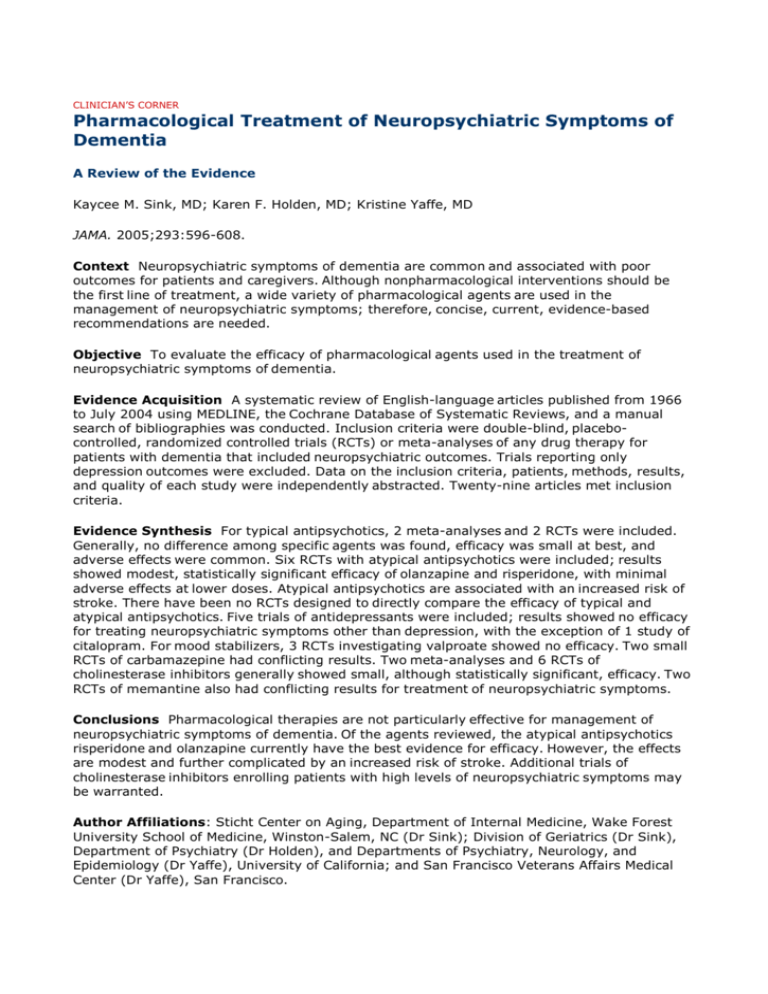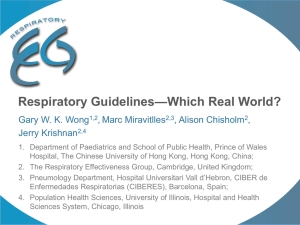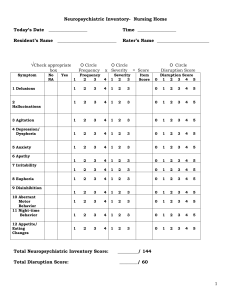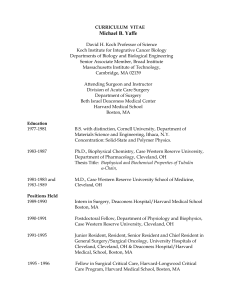CLINICIAN`S CORNER Pharmacological Treatment of
advertisement

CLINICIAN’S CORNER Pharmacological Treatment of Neuropsychiatric Symptoms of Dementia A Review of the Evidence Kaycee M. Sink, MD; Karen F. Holden, MD; Kristine Yaffe, MD JAMA. 2005;293:596-608. Context Neuropsychiatric symptoms of dementia are common and associated with poor outcomes for patients and caregivers. Although nonpharmacological interventions should be the first line of treatment, a wide variety of pharmacological agents are used in the management of neuropsychiatric symptoms; therefore, concise, current, evidence-based recommendations are needed. Objective To evaluate the efficacy of pharmacological agents used in the treatment of neuropsychiatric symptoms of dementia. Evidence Acquisition A systematic review of English-language articles published from 1966 to July 2004 using MEDLINE, the Cochrane Database of Systematic Reviews, and a manual search of bibliographies was conducted. Inclusion criteria were double-blind, placebocontrolled, randomized controlled trials (RCTs) or meta-analyses of any drug therapy for patients with dementia that included neuropsychiatric outcomes. Trials reporting only depression outcomes were excluded. Data on the inclusion criteria, patients, methods, results, and quality of each study were independently abstracted. Twenty-nine articles met inclusion criteria. Evidence Synthesis For typical antipsychotics, 2 meta-analyses and 2 RCTs were included. Generally, no difference among specific agents was found, efficacy was small at best, and adverse effects were common. Six RCTs with atypical antipsychotics were included; results showed modest, statistically significant efficacy of olanzapine and risperidone, with minimal adverse effects at lower doses. Atypical antipsychotics are associated with an increased risk of stroke. There have been no RCTs designed to directly compare the efficacy of typical and atypical antipsychotics. Five trials of antidepressants were included; results showed no efficacy for treating neuropsychiatric symptoms other than depression, with the exception of 1 study of citalopram. For mood stabilizers, 3 RCTs investigating valproate showed no efficacy. Two small RCTs of carbamazepine had conflicting results. Two meta-analyses and 6 RCTs of cholinesterase inhibitors generally showed small, although statistically significant, efficacy. Two RCTs of memantine also had conflicting results for treatment of neuropsychiatric symptoms. Conclusions Pharmacological therapies are not particularly effective for management of neuropsychiatric symptoms of dementia. Of the agents reviewed, the atypical antipsychotics risperidone and olanzapine currently have the best evidence for efficacy. However, the effects are modest and further complicated by an increased risk of stroke. Additional trials of cholinesterase inhibitors enrolling patients with high levels of neuropsychiatric symptoms may be warranted. Author Affiliations: Sticht Center on Aging, Department of Internal Medicine, Wake Forest University School of Medicine, Winston-Salem, NC (Dr Sink); Division of Geriatrics (Dr Sink), Department of Psychiatry (Dr Holden), and Departments of Psychiatry, Neurology, and Epidemiology (Dr Yaffe), University of California; and San Francisco Veterans Affairs Medical Center (Dr Yaffe), San Francisco.



![Quality assurance in diagnostic radiology [Article in German] Hodler](http://s3.studylib.net/store/data/005827956_1-c129ff60612d01b6464fc1bb8f2734f1-300x300.png)





